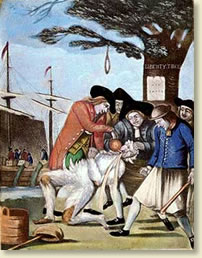thot this particular day in history was perhaps one of the more significant...
this piece seems to be as much op/ed as documentary, but eye kinda like the POV
(a '76 HSgrad mesself, having missed the courses on revisionist history, i'll assume its correct...
and being orig from the state of MA (in my k-12days) cant help but wonder what these people would think/have to say about whats happened since, esp in MA ;)
and more, with less op/ed - from the wiki-P:
yep - its often been my opinion that if the folks from them daze returned, they wouldnt be very happy with the way things have turned out and would likely, IMHO, burn washinton dc to the ground and start over.
i also believe they would start the first blaze at this address:
The Marriner S. Eccles Federal Reserve Board Building
but short of that, they would, at the very least WANT TO KICK OUT ALL THE INHABITANTS OF THE BELTWAY and make them all re-apply for their jobs, excluding anybody who's been there more than 12years (since they ARE The Problem)
just my .02, as a simple tradesman, representing only myself, but perhaps voicing the frustrations that (most of) 'the 69%' are feeling - with not only the 1%, but their enablers in the political class...
HAVE A GREAT WEEKEND EVERYBODY, only 9daze and countin (til the end, FINALLY, of 'shopping season' ;)
this piece seems to be as much op/ed as documentary, but eye kinda like the POV
(a '76 HSgrad mesself, having missed the courses on revisionist history, i'll assume its correct...
and being orig from the state of MA (in my k-12days) cant help but wonder what these people would think/have to say about whats happened since, esp in MA ;)
Originally posted by eyewitnesstohistory.com
Originally posted by .wikipedia.org
yep - its often been my opinion that if the folks from them daze returned, they wouldnt be very happy with the way things have turned out and would likely, IMHO, burn washinton dc to the ground and start over.
i also believe they would start the first blaze at this address:
The Marriner S. Eccles Federal Reserve Board Building
but short of that, they would, at the very least WANT TO KICK OUT ALL THE INHABITANTS OF THE BELTWAY and make them all re-apply for their jobs, excluding anybody who's been there more than 12years (since they ARE The Problem)
just my .02, as a simple tradesman, representing only myself, but perhaps voicing the frustrations that (most of) 'the 69%' are feeling - with not only the 1%, but their enablers in the political class...
HAVE A GREAT WEEKEND EVERYBODY, only 9daze and countin (til the end, FINALLY, of 'shopping season' ;)



Comment